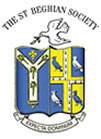|
 |
The Old St Beghian | |
| January 2022 | |||
Peter Morris (G 60-65).
Richard Hughes (SH 60-63) has kindly written the following.
“The death of Peter Morris on September 6th at the age of 74 prompted a huge response from his many friends and associates in the world of academia and commerce. Peter’s distinguished career straddled the worlds of both higher education and business. He held senior positions in several leading universities including Oxford and Manchester and concluded his career as Emeritus Professor of Construction and Project Management at University College, London. In his long career he also worked for several management consultancies throughout the world and was a director of Bovis, the large international construction company.
He wrote many books and hundreds of articles on the subject he had helped create, project management. One of his most influential works was ‘Reconstructing Project Management’; he also edited ‘The Oxford Handbook of Project Management’. When Peter graduated from Manchester University in 1968 with a degree in civil engineering the initial intention was that he would assume responsibility for the family decorating and plumbing business in Southport. Fate decreed otherwise. Peter remained at Manchester pursuing a PhD thesis which, when published, opened up a new world to him. His thesis was considered ground-breaking and helped establish the relatively new subject area of project management. Peter’s subsequent career took him round the world before his return to England to assist with the establishment of project management studies at Oxford University. He settled down with his beloved family in a beautiful home in Oxfordshire.
At St Bees, Peter’s formidable intellectual skills, while not exactly lying dormant, were yet to develop. But he was one of those fortunate students who could have followed sixth form courses in either the arts or the sciences. He chose sciences but always maintained a huge interest in all aspects of the arts and humanities and in particular he loved music and was a skilled player of the piano. Peter was often called ‘Grindal’ at St Bees; this was his middle name in recognition of the fact that he was a descendant of Edmund Grindal, the founder of the school and a prominent sixteenth-century Archbishop of Canterbury. It must be said that Peter found the frequent references to his distinguished ancestor a little wearisome; he had a wise and benevolent scepticism towards many aspects of life, including institutional religion; the fervent evangelical Protestantism which Archbishop Grindal was noted for was not quite to his taste.
Peter’s life was blessed in many ways. He was hugely distinguished in his chosen career but, above all, he was a devoted family man and once the travelling years were over he was at his happiest at home with his wife, Carolyn, and children Simon, David and Charlotte. Recently a new generation came about with the birth of a grandson, Arthur. Sadly Peter’s later years were blighted by poor health; two bouts of different types of cancer and the onset of Parkinson’s disease cast a shadow. He battled against these setbacks with his customary fervour and good humour and always knew the joys of his life far outweighed the setbacks. He will be sadly missed by, above all, his strong family but also by the many people who knew and respected him as a friend and a colleague.I would like to thank Peter’s contemporaries in Grindal, Grant Muter (G 60-65) and David O’Connor (G 59-65), for their help with this tribute.”
Home
The St Beghian Society
St Bees School,
St Bees, Cumbria, CA27 0DS.
Tel: (01946) 828093 Email: osb@stbeesschool.co.uk
Web: www.st-beghian-society.co.uk
![]()
.jpg)
.jpg)